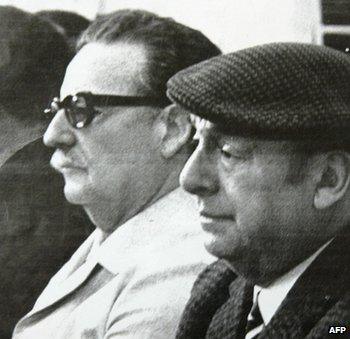Fresh tests for poet Pablo Neruda's remains in Spain
- Published

Pablo Neruda (right) was a close friend of President Salvador Allende (left)
A Chilean judge has ordered that bone samples from the deceased Nobel prize-winning poet Pablo Neruda be sent to Spain for fresh toxicology tests.
Scientists in the US are also testing Mr Neruda's remains to establish whether he was poisoned, as his former driver has maintained for years.
The left-wing poet died in 1973, days after the military coup that brought General Augusto Pinochet to power.
Initial findings seemed to support the official line that he died of cancer.
The results did not, however, rule out poisoning, requiring more in-depth tests.
A laboratory in the US state of North Carolina will analyse the samples, while scientists at the university of Murcia, in Spain, run parallel tests, a nephew of the poet, Rodolfo Reyes, said.
'Important analysis'
The tests in Spain will be supervised by the Spanish expert Aureliano Luna Maldonado, who also oversaw the exhumation of the poet's remains in May.
"It seems to us that every expert analysis which helps to clarify Neruda's death is very important," Mr Reyes told Chile newspaper El Mercurio.
Initial tests appeared to confirm the official version of events, that at the time of his death, Pablo Neruda was suffering from advanced prostate cancer metastasis.
But his former driver and personal assistant, Manuel Araya, maintains that Mr Neruda was poisoned.
Mr Araya says he called him from hospital, and told him he was feeling sick after having been given an injection in the stomach.
The poet was a close friend of ousted Chilean President Salvador Allende. He died aged 69, just 12 days after Gen Pinochet's coup.
Mr Neruda was buried next to his wife, Matilde Urrutia, in the garden of their home on the Pacific coast of Chile in Isla Negra, some 120km (75 miles) west of Santiago.
In 2011, Chile started investigating Mr Araya's allegations.
They are backed by the Chilean Communist Party, which says that Neruda did not exhibit any of the symptoms associated with the advanced cancer he is reported to have died of.
They say the military government feared Neruda would go into exile in Mexico and campaign against the Pinochet regime.
- Published3 May 2013
- Published12 April 2013
- Published8 April 2013
- Published8 April 2013
- Published21 March 2013